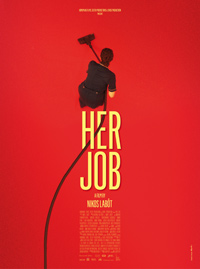Scrubbing up: Labôt Debuts with Nuanced, Powerful Greek Drama of a Woman at Work
 Her Job, Greek director Nikos Labôt‘s first feature roots its setting in the sociopolitical landscape of present-day Greece in the state of crisis, but also focuses on a story of a female character, who finds herself at the intersection of several social layers including patriarchal family relations, class issues, and gender-role conventions.
Her Job, Greek director Nikos Labôt‘s first feature roots its setting in the sociopolitical landscape of present-day Greece in the state of crisis, but also focuses on a story of a female character, who finds herself at the intersection of several social layers including patriarchal family relations, class issues, and gender-role conventions.
Her Job sets up its narrative by scrutinizing the life of middle-aged, functionally illiterate housewife Panagiota. This life mostly consists of providing housework services to her husband and two kids, and going largely unnoticed otherwise. When Panagiota suddenly gets the opportunity to take up her first job and become breadwinner, it paves her path to self-exploration despite the exploitative nature of her new profession. Actress Marisha Triantafyllidou gently delivers the powerful image of a humble woman discovering her new social status and struggling with all the controversial expectations imposed by society without being equipped with any tools to address them critically.
The film takes place in a series of everyday, domestic locations, the most important of which is the family home. It becomes the perfect environment for the children-kitchen-church formula of womanhood, that is until a new shiny mall appears to subvert the status quo. Close-ups on Panagiota’s timid emotions are all the comments we need to chart her steps towards breaking free; character development comes through well-observed gestures rather than words, which is ironic considering everyone around her does plenty of verbalizing – and mainly through complaints.
Along with this transformation, the color scheme becomes crucial: the soft-to-dark tints accompanying the protagonist meet a vibrant red, manifested through the floor-scrubber she learns to drive, the carpet she cleans, and lately even the dress she starts wearing. According to Labôt, the film is inspired by a real person, though the character’s psychology is thinly drawn at first (her only distinct habit being smoking the occasional cigarette).
Gradually, the individual portrait becomes richer and richer, naturally preparing the shift in her work routine and her attitude. Work is a liberating force, even if it brings along the classic double burden imposed on women: she now has to figure out how to juggle her job and home responsibilities. Meanwhile, the repetitive occurrence of cleaning and vacuuming bring the film’s rhythm closer to a slowed-down version of Krešimir Golik’s From 3 to 22 (1966). However, almost half a century later, Labôt’s work aims to finally find the character’s true voice, by leaving Her Job‘s climactic confrontation in the air.
Finding emancipation while being underpaid and manipulated into accepting exploitative work conditions may seem counter-intuitive, but Labôt’s perspective foregoes these conceptual notions in favor of a story placed firmly in the reality of contemporary Greece and the options it affords women. By gently exploring the world of his character through the tiniest details, he shows that such a transition, and ultimately change, is possible even in a complicated environment. The straightforward but tactful way in which Labôt approaches the material should be appealing to audiences, making Her Job a lively and empathetic journey.
Reviewed on October 20th at the 2018 Warsaw International Film Festival – Competition 1-2. 90 Mins. Part of the The Fipresci Warsaw Critics Project.
★★★/☆☆☆☆☆


